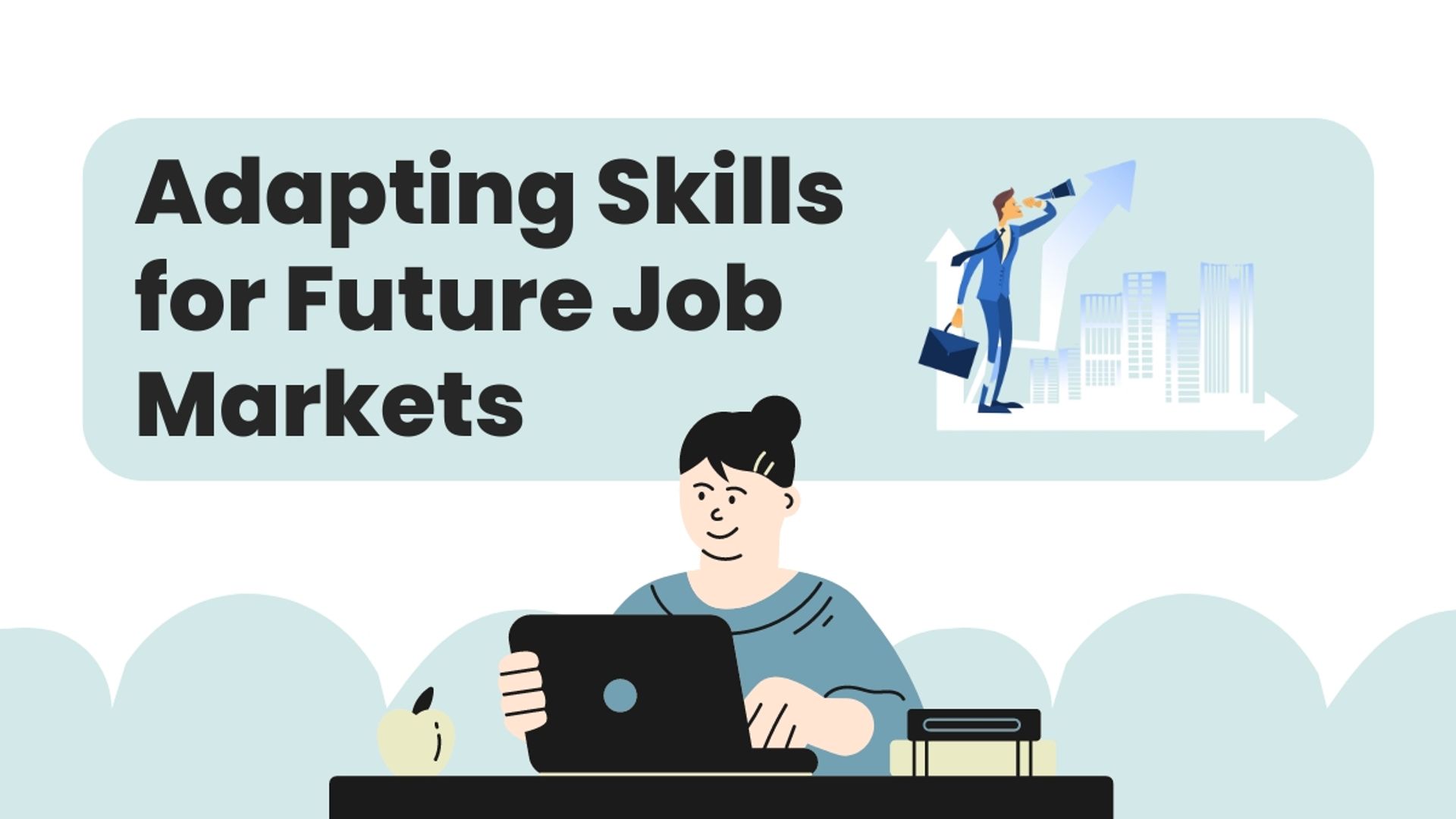The job market is experiencing significant changes due to fast-paced technological advancements, globalization, and shifting business models. As we steer close the Fourth Industrial Revolution, it's more important than ever to adapt our skills to keep up with future demands. To help you adapt smoothly to the coming wave of revolution, this article explores the impact of technological disruption, the importance of upskilling, the most in-demand hard skills, and essential soft skills required for future success.
Technological Disruption
Technological disruption is rapidly transforming industries like never before. Breakthroughs in machine learning (ML), blockchain, and artificial intelligence (AI) are not only changing job roles but also paving the way for fresh opportunities. However, they also pose challenges, rendering some skills obsolete and necessitating the acquisition of new competencies.
As technology continues to advance and integrate into the workplace, the automation of many jobs is unavoidable. However, this doesn't imply that the human element will be entirely replaced. Although traditional work practices are being disrupted, the importance of human skills will remain significant, particularly in technology-driven roles, where their value might even increase.
The rise of automation and AI, for instance, threatens traditional jobs but simultaneously opens doors to new professions. A World Economic Forum report predicts that by 2025, automation will eliminate 85 million jobs, while simultaneously generating 97 million new positions. This change in viewpoint underscores the significance of adopting a proactive approach to improving skills.
To get ready for what the future holds, there are key steps you can take. We’ve put together a guide offering insights into the evolving landscape of work and tips on how to build and maintain resilience moving forward.
The Importance of Upskilling
Consistent learning and upskilling are vital to keep individuals current and competitive in the job market. Organizations also benefit from a skilled workforce capable of utilizing new technologies to drive innovation and growth.
Upskilling involves constantly seeking ways to improve your skills through various methods, such as formal education, internal training courses, external training courses, and informal training like taking free online courses or working one-on-one with a manager or mentor. This multifaceted approach to skill enhancement is crucial for staying competitive.
More and more, companies are emphasizing potential in addition to hard skills and experience when making hiring decisions. With the workplace changing, employers are looking for employees who are adaptable and adept at tackling new challenges. Prioritizing upskilling is a way to fulfill these expectations.
This presents a great chance for you to be sought after not just for your current professional abilities, but also for the professional you can grow into with the right training, experience, and opportunities for development. Embracing a mindset of continual learning is crucial for both individuals and organizations who want to succeed in the future job market.
In-Demand Hard Skills for the Future
1. Machine Learning
Machine learning, a subset of artificial intelligence, strives to cultivate algorithms that empower computers to learn from data and render informed decisions. This technology is the driving force behind various applications, including recommendation engines and self-driving cars. To excel in machine learning, one needs to be skilled in programming languages such as Python and R, along with having a strong foundation in data analysis and statistical modeling.
Machine learning experts are highly sought after in various sectors like technology, finance, healthcare, and retail. As companies place more emphasis on data-driven decision-making, the need for machine-learning skills is expected to grow significantly.
2. Artificial Intelligence
Artificial intelligence encompasses a broader spectrum of technologies, including machine learning, natural language processing, and computer vision. AI is revolutionizing industries by streamlining processes, boosting decision-making capabilities, and elevating customer experiences. Understanding AI concepts and tools is essential for future job roles in AI development, data science, and robotics.
AI skills will help individuals execute tasks within a fraction of the time they would need otherwise which can steadfast the company's progress tenfold. Individuals adept at utilizing AI tools will surely have an upper hand in job acquisition in the future due to their improved resourcefulness.
3. Cybersecurity
As digital transformation accelerates, cybersecurity has become a critical concern. The rise in data breaches, cyber threats, and ransomware attacks highlights the need for potent security measures. Cybersecurity professionals are pivotal in protecting confidential data, upholding network integrity, and mitigating potential threats.
Important cybersecurity skills comprise understanding ethical hacking, network security, incident response, and cryptography. Certifications such as Certified Information Systems Security Professional (CISSP) and Certified Ethical Hacker (CEH) are highly regarded in this field.
4. Data Science
Data science includes extracting insights from large data sets to guide business decisions, blending statistics, computer science, and domain knowledge. Data scientists use tools like SQL, Python, and Hadoop to analyze data and create predictive models. This discipline is employed across various industries to identify trends or patterns that help solve problems or confirm hypotheses, such as in drug development, climate change research, and stock market predictions.
The increasing need for data scientists spans various industries, driven by organizations aiming to leverage big data for a competitive edge. In the future, the ability to integrate data science with other skills like coding and machine learning will be increasingly valuable. Proficiency in data visualization, machine learning, and data wrangling, alongside a strong foundation in statistics and data filtering, particularly benefits those familiar with the financial industry.
5. Low-Code/No-Code Development
Low-code and no-code platforms empower users, often known as citizen developers, to build applications using an easy-to-use visual interface that relies on a straightforward drag-and-drop approach for assembling application components. This approach allows business users to build tailored solutions without writing any code. While it does not substitute professional software developers, it enhances the development process and accelerates productivity. Proficiency in low-code/no-code tools like Microsoft PowerApps and Out Systems is becoming increasingly important in the modern workplace.
These platforms streamline workflow processes, leading to significant time savings and long-term reductions in overhead expenses. Consequently, they are highly beneficial for positions in IT, business analysis, and product management. By bridging the distance between technical and non-technical teams, low-code/no-code development fosters innovation and efficiency. Embracing these tools ensures that employees focus on more strategic tasks, enhancing overall organizational productivity and potential.
Essential Soft Skills for Future Work
1. Digital Literacy
Digital literacy refers to the skill of utilizing digital technologies efficiently and responsibly. As digital tools become ubiquitous in the workplace, digital literacy is no longer optional. It includes skills such as navigating software applications, managing online communication, and understanding digital privacy.
Employers value digitally literate employees who can adapt to new technologies and leverage them to enhance productivity. Enhancing digital literacy continuously is crucial to staying abreast of technological advancements.
2. Customer Relationship Management
This skill entails effectively handling customer interactions to enhance satisfaction and foster loyalty. In a customer-centric business environment, CRM skills are crucial for roles in sales, marketing, and customer service. Proficiency in CRM tools such as Salesforce and HubSpot is greatly sought after.
Effective CRM entails understanding customer needs, providing personalized experiences, and maintaining strong communication channels. Establishing and nurturing customer relationships is the cornerstone of achieving business success and fostering growth.
3. Influencing
Influencing involves the skill of persuading and motivating others to reach desired goals and outcomes. It is a key skill for leaders, managers, and team members alike. Effective influencing requires strong communication, empathy, and negotiation skills.
In a collaborative work environment, the ability to influence others fosters teamwork, drives change, and enhances decision-making. Building this skill enables individuals to effectively manage intricate organizational dynamics and reach their objectives.
4. Data-Based Decision Making
Utilizing data-driven methodologies, decision-making processes leverage data and analytics to inform strategic business decisions. It requires analyzing data, spotting patterns, and extracting actionable insights. As organizations increasingly rely on data for strategic planning, this skill is essential for roles in management, finance, and marketing.
Proficiency in data analysis tools and techniques, coupled with critical thinking, enables individuals to make informed decisions that drive business success. This skill guarantees that decisions are grounded in solid evidence, remain impartial, and align closely with the organization’s objectives.
5. Innovative Thinking
Innovative thinking refers to the capacity to develop creative solutions for challenging problems. It entails approaching situations from a fresh perspective, welcoming change, and making strategic decisions when taking risks. In today’s fast-evolving job market, cultivating innovative thinking is essential for remaining competitive and navigating emerging challenges.
Promoting innovation in organizations drives continuous improvement and spurs growth. Employees fostering innovative thinking are pivotal in developing new products, services, and business models.
Conclusion
The future job market is gearing up with fast technological advancements and demands individuals to evolve their skills to catch up to them. To succeed in this dynamic environment, both organizations and individuals must prioritize upskilling and embrace a future-ready mindset. Mastering in-demand hard skills as mentioned above is crucial for building a fruitful career in the future. Equally important are soft skills which will help you adapt and excel in any field of your choosing.
By proactively adapting to these changes and continuously investing in skill development, we can navigate the challenges and seize the opportunities presented by the future job market. Embracing lifelong learning, fostering innovation, and staying agile will be the keys to success in this ever-evolving landscape.


